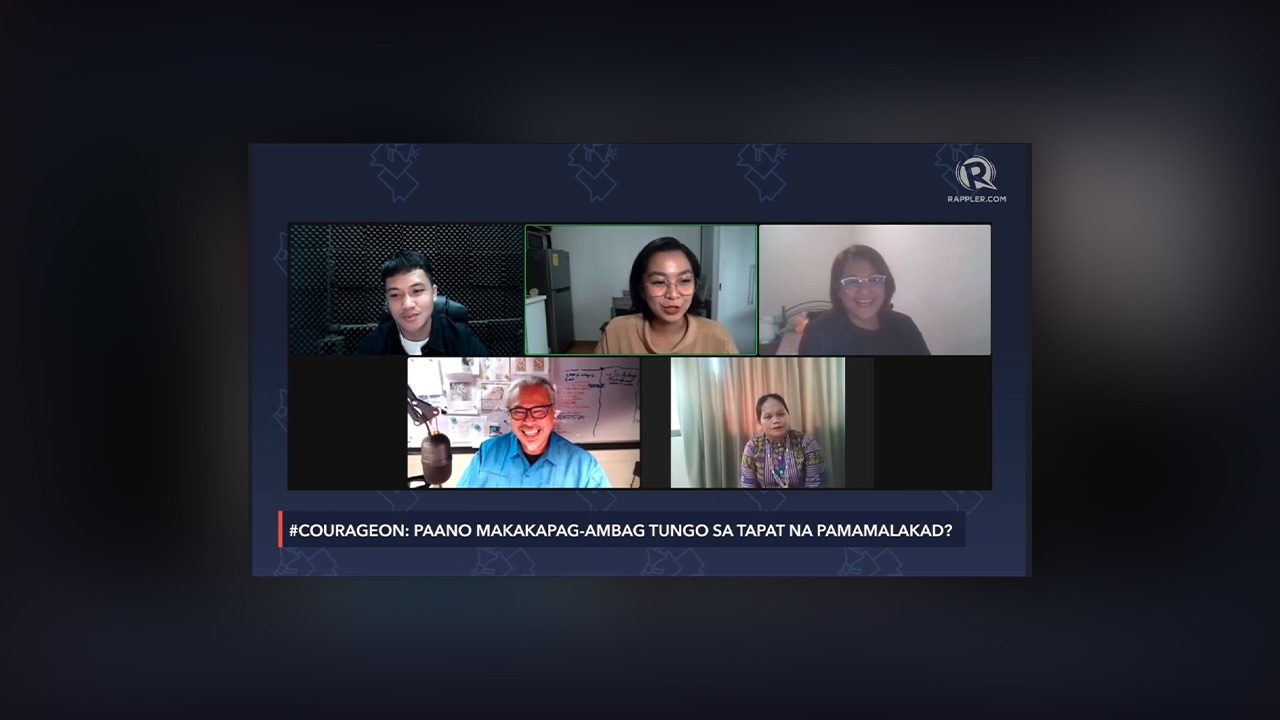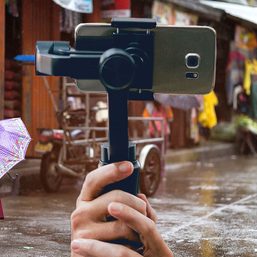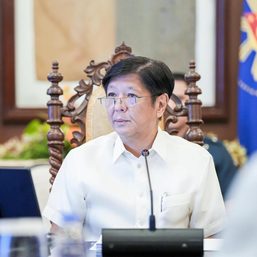SUMMARY
This is AI generated summarization, which may have errors. For context, always refer to the full article.

MANILA, Philippines – How can Filipinos help push for good governance in their community?
Representatives from 1Sambubungan, Concerned Artists of the Philippines, Kontra Daya, and Legal Network for Truthful Elections (LENTE) talked about this and said understanding governance should start in our shared experiences on the ground.
These civil society groups were part of panel in the episode of MovePH’s ‘#CourageON: Paano makakapag-ambag tungo sa tapat na pamamalakad?’ on Wednesday, July 20, in time for President Ferdinand Marcos Jr.’s State of the Nation Address.
Kontra Daya convenor Malou Turalde used the current economic inflation in the Philippines as an example of how governance can impact marginalized sectors. She said the need to make people see how governance is not an abstract concept, but one with implications that can be felt in the policies and experiences we encounter.
“Ito yung pakahulugan sa governance. Dapat ’di siya hiwalay doon sa pang araw-araw na buhay, hindi siya dapat makitang abstrakto. But rather nakakonekta siya sa sikmura lalo na ng mga mahihirap nating kababayan…na kadalasang hindi nakakakuha ng access sa serbisyo,” Turalde said.
(This is the definition of governance. It should not be separated from everyday life. It should not be seen as abstract. But rather, it is connected to the gut, especially of marginalized sectors who usually don’t get access to services.)
Representatives said inclusivity is an important element to good governance and is crucial to address the needs of all citizens.
“Public leaders should have a sense of leadership that is inclusive. Their way of treating people should be consensus-oriented, and, of course, their concept of a governing body is participatory,” Concerned Artists of the Philippines board member Toym Imao said in a mix of Filipino and English.
1Sambubungan Teduray indigenous leader Jen Cornelio added how inclusive leadership is important, most especially in the indigenous community, to address the challenges and lack of services in their ancestral domain.
“[Dapat] ang tinitignan ng pamahalaan ay yung makataong pagtrato sa mga nasasakupan nito…Sa tingin namin hindi sapat na magpapalit ka lang ng posisyon sa Malacañang, dapat malalim ang iyong pagkakaunawa sa kasalukuyang karanasan ng mga mamamayan, lalo’t higit sa mga katutubo,” Cornelio said.
(What the government should focus on is the humane treatment of its constituents…We think that it is not enough to plainly change your position in Malacañang. You must have a deep understanding of the current experience of the citizens, especially with indigenous communities.)
These are why it’s important that people must engage with government, and for government to listen as well, as good governance can help provide better services and policies to citizens.
Why everyone should push for good governance
According to Turalde, good governance is not usually given to us on a silver platter and should not solely depend on politicians – but rather, this is something that should reinforced by citizens.
“Dapat open ang ating pamahalaan doon sa pag-kritik mismo ng taumbayan dahil ito naman talaga ang papel natin. Hindi magbabago ang isang sitwasyon kung walang nagsasalita, bahagi yun ng ating kaparatan na magsalita at magtuwid,” Cornelio said.
(Our government should be open to criticism because this is our role as citizens, a situation won’t change if no one speaks about it, that is part of our duty to speak and correct.)
“Importante talagang may partisipasyon para sa paghuhulma ng kaisipan at pag-contribute sa pagbabago sa lipunan…mutually beneficial na nag-paparticipate tayo doon sa ating pagpu-push, but at the same time yung institution building–kailangan na kailangan yan sa isang demokrasya na working and enduring,” Turalde added.
(Participation is really important in order to shape culture and contribute to social change. Participation is mutually beneficial for us as we push officials, but at the same time it is necessary in institution building, especially in a democracy that is working and enduring.)
Demanding accountability
Among the ways that citizens can demand transparency and accountability in their communities is by joining groups and campaigns that aim to keep watch on laws and policies in local government units.
“Dapat nag-e-engage din tayo sa pag-go-gobyerno sa lokal. Makakatulong tayo sa pagpapasa ng mga ordinance para i-amplify yung transparency and accountability…Dapat i-pursue natin yun para na-incentivise din yung partisipasyon ng mamamayan at yung mga pag aagam-agam natin ay masolusyonan,” Turalde said.
(We also need to engage with local governance. We can help in passing ordinances to amplify transparency and accountability. We must pursue this so that the people’s participation is also incentivized and our doubts can be lessened.)
Especially with the barangay and Sangguniang Kabataan (SK) elections set to happen this December, Legal Network for Truthful Elections (LENTE) executive director Atty. Ona Caritos introduced the #NoToBSKE2022Postponement campaign to encourage citizens to register and elect village and youth leaders in local communities.
This is long overdue as the barangay and SK elections were postponed from 2016 to 2022. Two separate House bills have also been filed seeking to reset the said polls to either May 2024 or December 2025.
“Ang SK ang tinitignan namin [bilang] isang napakalaking oportunidad para mabago ang mukha ng pulitika sa Pilipinas… Kapag hindi gusto ang mga nakaupong opisyales, ang kanilang performance, the primary accountability tool that we can all use is elections,” Caritos said.
(We see SK as a huge opportunity to change the face of politics in the Philippines. If we’re not satisfied with the performance of our seated officials, the primary accountability tool that we can all use is elections.)
Imao also suggested joining cultural and art circles to continually use creative platforms to secure and preserve historical materials. He said that this is another way of demanding accountability especially when new audiences are tapped and encouraged to keep the conversation going.
“What’s important is we rally around organized groups, support them, work with them. There is already an existing necessary infrastructure of civil society that we can be part of in their efforts to safeguard our rights and push necessary programs in government,” Imao said in a mix of Filipino and English.
The #CourageON show was organized by MovePH, with Concerned Artists of the Philippines; iDefend; Karapatan; Kontra Daya; K4 Kilos na para sa Kalusugan, Kabuhayan, at Karapatan; LILAK; Move as One Coalition; and Power for People Coalition. It was also supported by the United Nations Joint Programme for the Promotion and Protection of Human Rights in the Philippines. – with reports from Alek Mangasar/Rappler.com
Alexandra L. Mangasar, who prefers to be called Alek, is a Rappler volunteer under MovePH. She is a 4th year Journalism student at the University of Santo Tomas.
Add a comment
How does this make you feel?

![[Be The Good] Introducing ‘The Listening Project’](https://www.rappler.com/tachyon/2024/05/carousel-4.png?resize=257%2C257&crop=424px%2C0px%2C1080px%2C1080px)

![[WATCH] #TheLeaderIWant: Filipino voters sound off on community issues a year before 2025 elections](https://www.rappler.com/tachyon/2024/05/filipino-voters-sound-off-on-community-issues-1.jpg?resize=257%2C257&crop=276px%2C0px%2C720px%2C720px)





There are no comments yet. Add your comment to start the conversation.